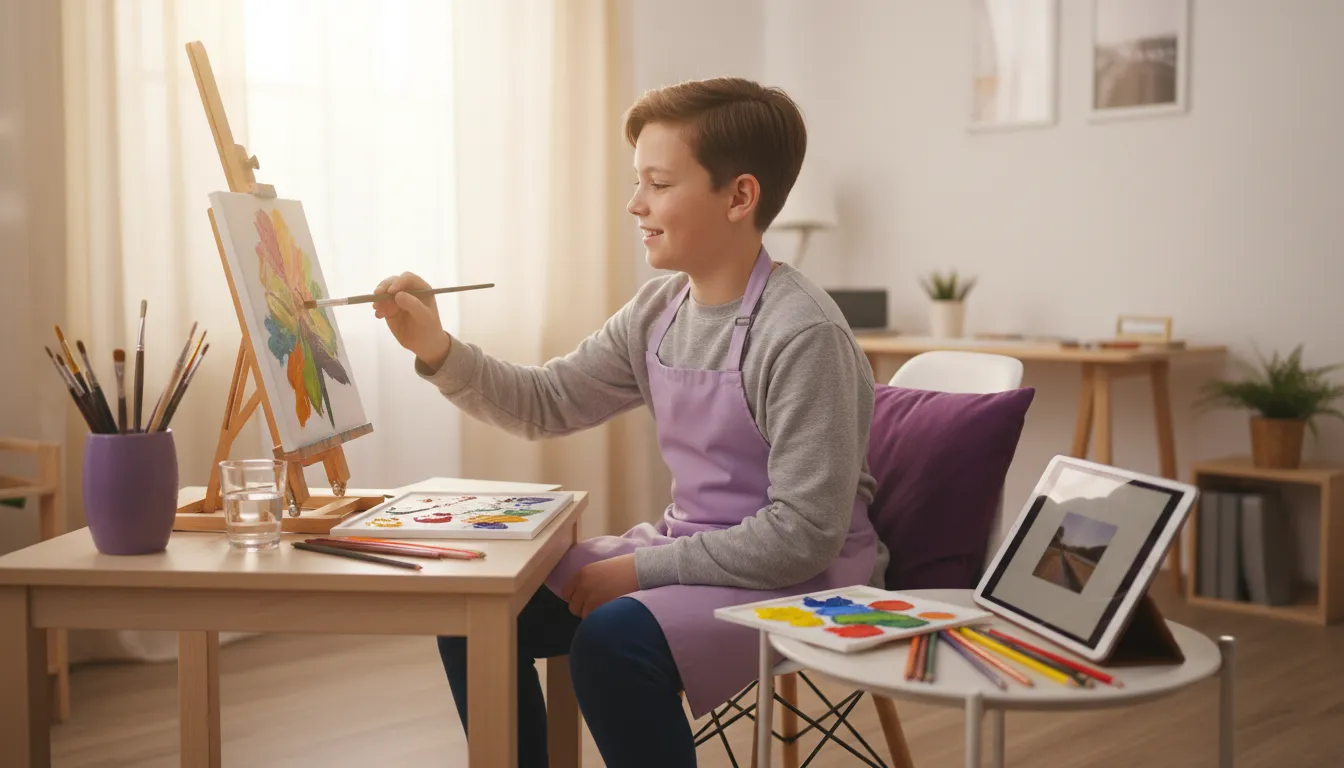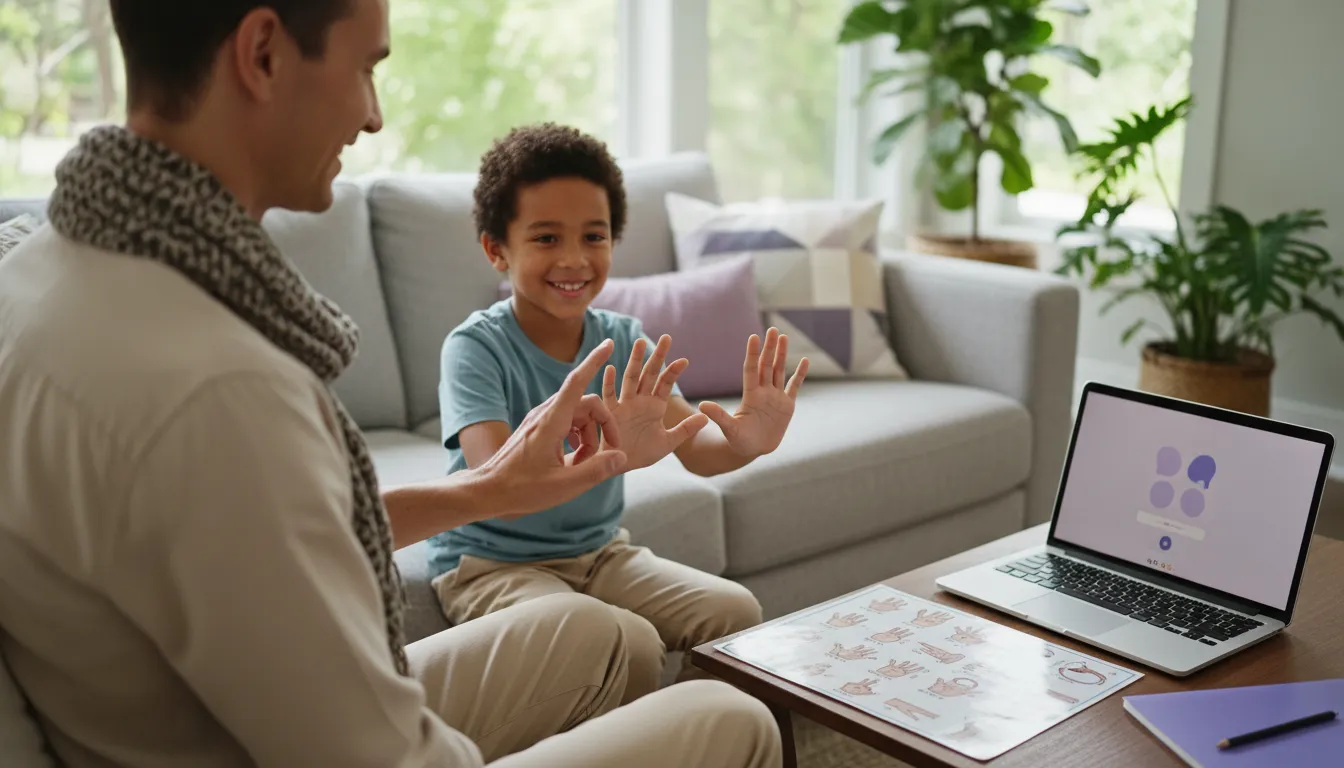When your 5th grader comes across a challenging text and begins to work through unfamiliar words with confidence, you’re seeing the value of a strong vocabulary foundation. A rich vocabulary can strengthen reading comprehension and support deeper learning across subjects, from science experiments to historical events.
As a homeschooling parent, you can make vocabulary practice both meaningful and enjoyable. Instead of relying only on memorization, weave new words into family conversations, projects, and everyday experiences. This guide highlights key vocabulary for 5th graders and offers strategies that fit naturally into your homeschool routine, with support from flexible resources like Outschool that help bring language learning to life.
Why vocabulary matters for 5th-grade homeschoolers
By fifth grade, vocabulary becomes one of the most important tools for learning. Strong word knowledge supports not only reading and writing, but also deeper thinking and success across every subject. Here’s why building vocabulary deserves attention in your homeschool:
- Strengthens reading comprehension: A rich vocabulary helps children understand more complex texts without getting stuck on unfamiliar words, making independent reading more enjoyable.
- Supports writing and communication: Knowing precise words allows learners to express their thoughts clearly in journals, essays, and everyday conversations.
- Builds critical thinking: Vocabulary gives children the language to compare, analyze, and evaluate ideas with nuance.
- Enhances subject learning: Science terms like hypothesis and variable, social studies words like perspective and democracy, and math terms like equivalent and proportion all become essential for understanding lessons.
- Encourages confidence: Using the right words helps children share their ideas in co-ops, projects, or family discussions with greater ease.
For homeschooling families, vocabulary is more than memorizing word lists. It’s about weaving new terms into daily conversations, field trips, and hands-on projects. Whether your child is curious about dinosaurs, cooking, or space exploration, connecting words to real interests makes learning meaningful and long-lasting.
What are the most important vocabulary words for 5th graders?
Key vocabulary for 5th graders often falls into five categories that support learning across all subjects. These words help children think critically, express complex ideas, and approach challenging texts with confidence:
- Academic thinking words such as "analyze," "infer," "contrast," and "summarize" strengthen higher-level thinking and appear often in writing, discussion, and standardized assessments.
- Evidence-based terms like "hypothesis," "variable," "conclude," and "evidence" prepare learners for science experiments, research projects, and logical reasoning.
- Perspective and relationship vocabulary, including "consequence," "influence," "adapt," and "perspective", help children understand character motivations, analyze historical events, and express their own viewpoints.
- Cross-curricular terms such as "determine," "interpret," "establish," and "significant" provide the language tools needed to grasp concepts and explain ideas across subjects.
- Descriptive and precise language with words like "authentic," "meticulous," "elaborate," and "compelling" encourages stronger, more engaging writing and communication.
These categories give 5th graders the foundation to grow as readers, writers, and thinkers while preparing them for more advanced learning ahead.
FIRST MONTH FREE!
Get support that meets kids where they are.
Learn moreCreative strategies to make vocabulary learning fun at home
Learning new words doesn't have to feel like a boring task. These fun vocabulary activities for 5th graders transform practice into engaging experiences where your child will naturally absorb and remember new words while having a blast.
- Turn learning into play with games like vocabulary bingo, charades using new terms, or riddles where your child gives clues for others to guess the word. These interactive activities make definitions stick through laughter and movement.
- Weave words into storytelling by having your child invent adventures with their vocabulary list, or pause during read-alouds to explore new words together.
- Create hands-on projects such as colorful word walls, personal vocabulary journals, or comic strips that bring words to life.
- Practice in everyday moments by encouraging your child to use new words at dinner, while shopping, or when describing their day. Regular use turns practice into a habit.
- Connect through multimedia by watching educational videos, making songs or raps, or illustrating vocabulary. These approaches can deepen understanding and retention.
- Explore real-world connections with trips to museums, nature walks, or community events where new words appear naturally. Online vocabulary classes also give learners opportunities to practice vocabulary with peers in interactive settings.
How to help 5th graders remember and use new vocabulary
Building vocabulary is more than memorizing definitions. Research suggests children often need multiple exposures to a word before it truly becomes part of their language. That means creating multiple touchpoints throughout your homeschool day.
Here are some effective strategies:
- Use visual supports: Create word maps that connect new vocabulary to images, synonyms, and personal experiences. For example, with the word "resilient," your child might draw an athlete overcoming challenges, write about a time they persevered, and list related words like "determined" or "persistent."
- Encourage active use: Invite your child to use target words in conversations, creative writing, or project presentations. They might describe a Minecraft build with words like "innovative" and "collaborate," or explain a nature walk using "observe" and "habitat."
- Celebrate progress: Acknowledge and praise when your child uses new words correctly. Positive reinforcement helps vocabulary practice feel rewarding and enjoyable.
- Connect across subjects: Science experiments naturally involve terms like "hypothesis," "variable," and "analyze." Social studies projects use "perspective," "consequence," and "influence." Math introduces "estimate," "calculate," and "interpret."
Homeschooling gives you the flexibility to weave vocabulary into every subject, turning new words into practical tools for understanding the world rather than isolated terms to memorize.
Vocabulary words for 5th graders: Frequently asked questions (FAQs)
These FAQs address concerns many homeschooling families share, along with practical solutions that fit a variety of approaches.
What are the best resources for 5th-grade vocabulary practice?
Parents often mix at-home strategies with structured support. Outschool offers live, small-group classes where learners can practice vocabulary through interactive games, storytelling, and writing projects. These sessions provide guidance while making word learning engaging and social.
How can parents support reluctant readers or writers with vocabulary?
Start with your child's interests and use vocabulary words that connect to their favorite topics, whether that's animals, sports, or video games. Make vocabulary feel like play through word games, storytelling, and hands-on activities rather than traditional worksheets. Building confidence with familiar contexts helps reluctant learners see vocabulary as exciting rather than intimidating.
How does a strong vocabulary benefit my child in other subjects?
Vocabulary serves as the foundation for understanding complex concepts across all subjects, from scientific terms in biology to historical terminology in social studies. Strong vocabulary skills help children comprehend math word problems, follow multi-step instructions, and express their thinking clearly in any subject. When children understand the language of learning, they can focus on mastering new concepts rather than struggling with unfamiliar words.
What are the signs my child needs extra vocabulary support?
Look for difficulty with grade-level texts, frequent requests for word definitions, or challenges expressing ideas in writing or conversation. Children who avoid reading independently or show frustration with new words may benefit from more targeted practice and support.
How can I support neurodiverse learners or different learning styles with vocabulary?
Adapt strategies to fit each learner. Visual learners may enjoy word maps or colorful charts, while kinesthetic learners thrive with movement-based activities like charades. For children with processing differences, break words into smaller parts, use consistent routines, and allow extra time. Outschool’s flexible online classes can also help by providing varied approaches that meet learners where they are.
Building vocabulary confidence at home
A strong vocabulary foundation gives 5th graders the tools to read with understanding, write with precision, and communicate with confidence. The best growth happens when new words are introduced in meaningful ways through stories, projects, conversations, and real-world experiences that make language stick.
To build on what you’re already doing at home, you can explore live, small-group classes that make word learning interactive and fun. Outschool offers flexible online options where learners practice vocabulary with peers, guided by teachers who connect new words to creativity and curiosity. These classes complement your homeschool approach and give your child opportunities to apply, share, and celebrate their growing vocabulary in a supportive community.






.svg)
.svg)







